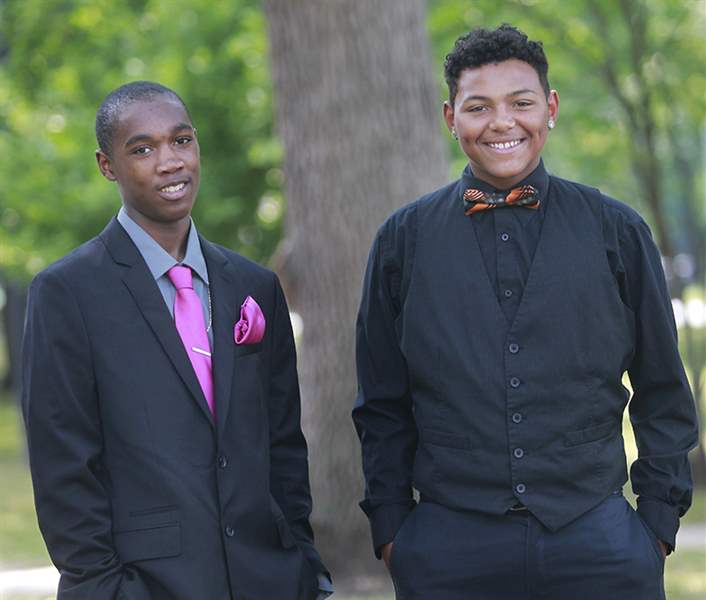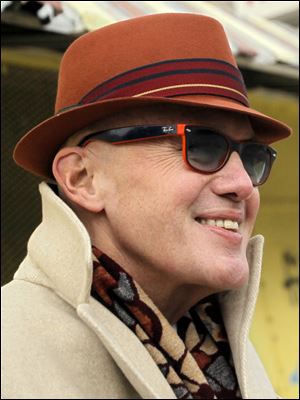
COMMENTARY
Inmates lift young lives in Toledo, Detroit
7/27/2014
Toledoans Isaiah Newton, left, and John Frison were among those awarded education money by the prisoners who run the Youth Deterrent Program.
THE BLADE/ISAAC HALE
Buy This Image

Toledoans Isaiah Newton, left, and John Frison were among those awarded education money by the prisoners who run the Youth Deterrent Program.

Jeff Gerritt
DETROIT — Toledo and Detroit joined hands last week to support and redeem troubled young men in their communities. Toledo Police Chief William Moton was there. So were Lucas County Sheriff John Tharp and more than 70 judges, elected officials, teachers, social workers, attorneys, parents, and young people.
This wasn’t a sit-down in a tony conference center, where self-important people pontificated about what’s wrong with today’s youth. Too often, the problem with today’s youth is today’s adults, especially those who demonize, fear, or fail to believe in the young men of our central cities.
That wasn’t the vibe Tuesday night. The meeting convened inside a prison on a blighted block on Detroit’s east side, where a handful of men who helped build Detroit’s reputation for violence are now working to change it, one life at a time.
Prisoners who run the Youth Deterrent Program at the former Ryan Correctional Facility honored people in Detroit and Toledo who have helped them in their life-saving mission. They also awarded education money to a dozen young men, including John Frison and Isaiah Newton of Toledo.
“We owe an enormous debt to our community and to ourselves,” Darryl Jamual Woods, Sr., 41, of Detroit, told me. He leads the Youth Deterrent Program and is serving a life sentence for murder. “Transforming a young man is a miracle. It gives us a sense of purpose and joy.”
In 2008, Woods and a dozen other inmates — members of the NAACP prison program — started bringing young men, ages 15 to 18, into the prison once a month for real talk on life and crime. A core group of founders, most serving life sentences for murder, remain; they include Michael 2X Tubbs, Dwayne Witherspoon, Everett Jackson, James Hill-El, and Michael Hatifield.
Young men are referred to Youth Deterrent by courts, juvenile homes, schools, law enforcement agencies, and even parents. In Toledo, referrals come from the Police Prevention Team.
Some young men have stolen cars (including carjackings), used or sold drugs, fought at school, or carried concealed weapons.
Youth Deterrent nearly closed in 2012, when the state converted the Ryan prison into a prisoner re-entry center. To its credit, the Michigan Department of Corrections allowed the men in Youth Deterrent to stay. With the backing of Warden Anthony Stewart and Deputy Warden Willis Chapman, they continue to run monthly three-hour sessions, with 30 to 40 young people at a time.
Three years ago, Frank Szymanski, a judge in Michigan’s Wayne County, started to promote Youth Deterrent. The program now has more people than it can handle. Through powerful and intimate dialogues, prisoners encourage and support the teenagers, while giving them cautionary tales of life on the street.
In one session, I saw a 17-year-old cry after describing how his mother had been shot to death. He was embraced by a 24-year-old prisoner who had lost his mother the year before. In another meeting, a 15-year-old broke down after telling how he watched his best friend get shot to death during a bank robbery.
If you can sell drugs, the prisoners tell the young men, you can run a business. Legitimize your hustle and legalize the product, they say.
Over the past six years, more than 2,000 teenagers have walked into the prison to get a dose of reality about where crime, violence, and poor choices can lead. Last year, the prisoners extended their mission to Toledo.
Since then, more than 100 young men from Toledo have come to the prison. There, the inmates separate the fantasies of thug life from the realities of living doubled-up in a closet-sized steel cell, losing family and friends, submitting to strip searches, and being constantly watched.
This year, the inmates also raised more than $2,000 to help some of the young men they’ve encountered continue their education. Raising money in prison, where jobs pay about $1 a day, is tough. Still, they donated some of the money themselves and raised more through the Prisoner Benefit Fund.
Jayelo Harvey, 18, who was practically abandoned as a child, was awarded $1,000 to help with expenses at Michigan State University, where he will major in biochemistry and psychology. Last week, he pledged to serve young people, as the prisoners had served him.
Inmates also spent hundreds of dollars on plaques and certificates of appreciation for dozens of people in Detroit and Toledo, including Chief Moton, Officers Floella Wormely and Byron Daniels, Lt. Phil Cook, and Sgt. Greg Mahlman of the Toledo Police Department.
The men gave 11 students, including John Frison, 16 , and Isaiah Newton, 15, both students at Woodward High School, $150 each for school supplies and expenses. John and Isaiah, both of North Toledo, attended a Youth Deterrent session in May, after they were suspended from school. Last week, they came to Detroit with Chief Moton and his officers.
“This is not a place I want to be,’’ said John, who plans to become a marine mechanic. He told me about a friend who was shot recently at a house party. He knows now he can get a serious conviction, under conspiracy laws, simply for being with someone who commits a crime.
Like John, Isaiah expected a lame and discredited “scared straight” show, where inmates scream and shout. Instead, they spoke calmly and respectfully.
“They made it real,’’ Isaiah told me. “They told us how they screwed up and how it felt to be in prison.”
Isaiah, who plans to become a dance choreographer or engineer, also plays violin and percussion. Both say they’re committed to doing better in school.
You can’t change someone else’s life without changing your own. My brother-in-law, Shannon Keys, 41, of Detroit, a founding member of Youth Deterrent, told me that seeing a light go on in the head of a young man he was talking to made him feel as though his own life hadn’t been wasted.
The Youth Deterrent Program has been replicated in two other Michigan prisons. The group wants to make it a national model.
June Werdlow Rogers — a consultant, university professor, and former federal drug agent — is conducting a survey to measure the program’s results. The study isn’t finished, but preliminary data show Youth Deterrent really does turn young men’s lives around.
“One hundred percent of them said the men cared about them,’’ Ms. Rogers said. “That’s why this program works.”
Our schools and criminal justice system are way too quick to give up on people, but no one can know and watch these men and not believe in the power of change and redemption. If everyone outside prison walls had a fraction of their commitment and compassion, we wouldn’t have to worry about violence in Detroit or Toledo.
These prisoners have looked into the darkness and found a light. Now they’re changing lives by delivering a message only they can give. Thanks to Chief Moton and his officers, young people in Toledo are hearing it too.
Jeff Gerritt is The Blade’s deputy editorial page editor.
Contact him at: jgerritt@theblade.com, 419-724-6467, or follow him on Twitter @jeffgerritt.